Ethics & Governance: Amcor Limited - Corporate Governance and Ethical Practices
VerifiedAdded on 2023/03/23
|15
|3661
|43
AI Summary
This paper evaluates the corporate governance and ethical practices of Amcor Limited, a global packaging company. It focuses on key areas such as board composition, ethical practices, and social and environmental disclosures. The company follows a stakeholder approach to management and emphasizes transparency and sustainability.
Contribute Materials
Your contribution can guide someone’s learning journey. Share your
documents today.
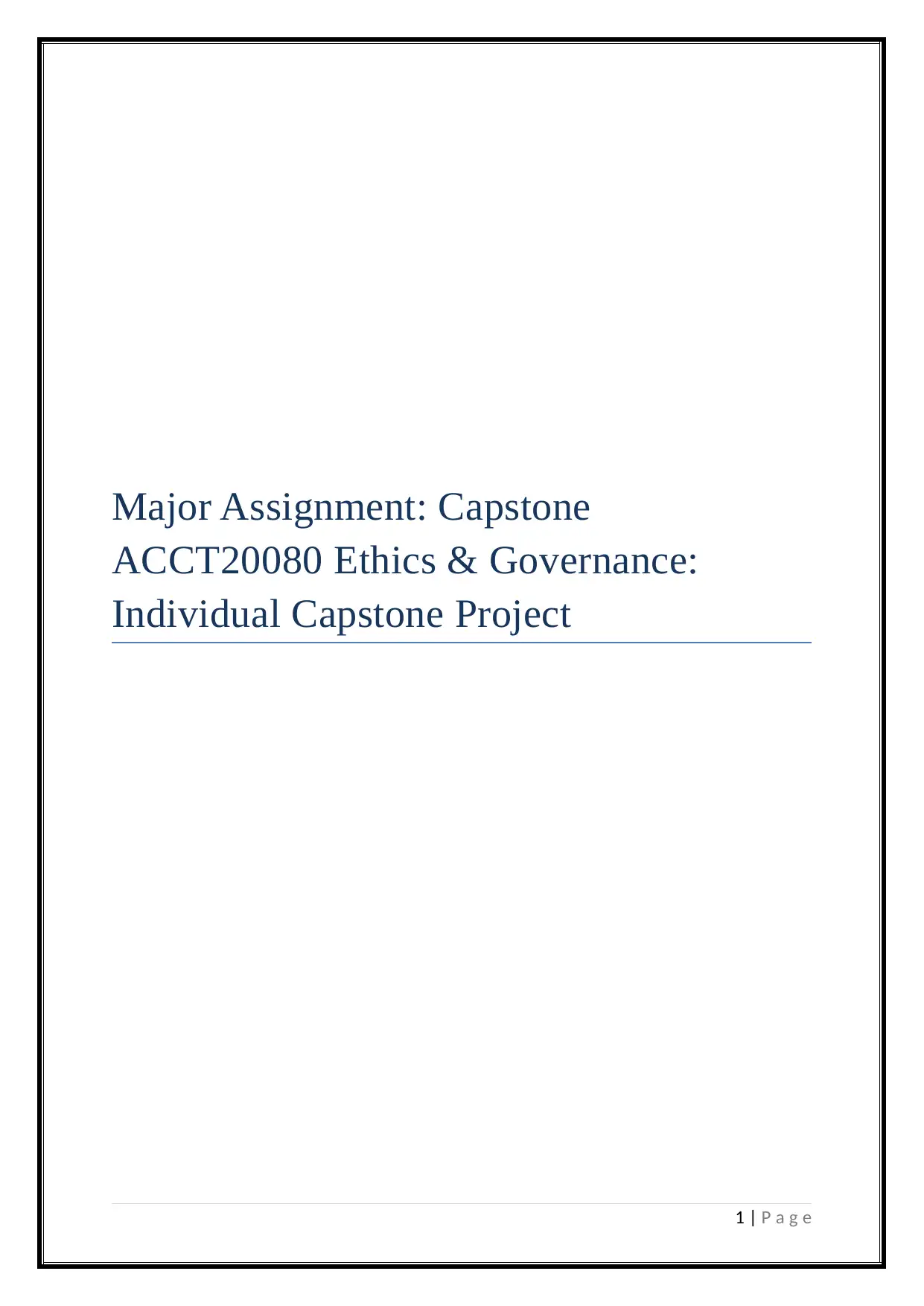
Major Assignment: Capstone
ACCT20080 Ethics & Governance:
Individual Capstone Project
1 | P a g e
ACCT20080 Ethics & Governance:
Individual Capstone Project
1 | P a g e
Secure Best Marks with AI Grader
Need help grading? Try our AI Grader for instant feedback on your assignments.
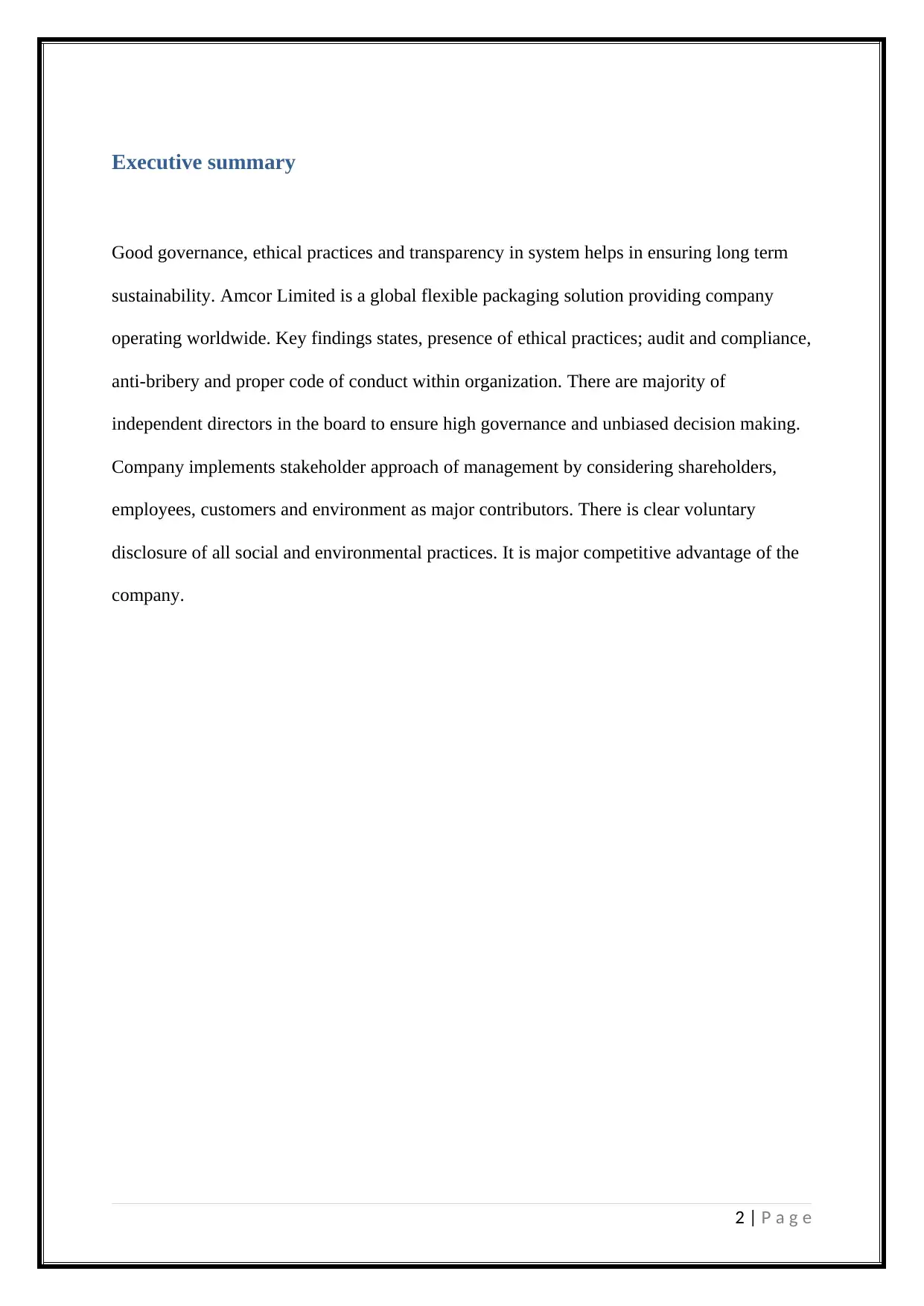
Executive summary
Good governance, ethical practices and transparency in system helps in ensuring long term
sustainability. Amcor Limited is a global flexible packaging solution providing company
operating worldwide. Key findings states, presence of ethical practices; audit and compliance,
anti-bribery and proper code of conduct within organization. There are majority of
independent directors in the board to ensure high governance and unbiased decision making.
Company implements stakeholder approach of management by considering shareholders,
employees, customers and environment as major contributors. There is clear voluntary
disclosure of all social and environmental practices. It is major competitive advantage of the
company.
2 | P a g e
Good governance, ethical practices and transparency in system helps in ensuring long term
sustainability. Amcor Limited is a global flexible packaging solution providing company
operating worldwide. Key findings states, presence of ethical practices; audit and compliance,
anti-bribery and proper code of conduct within organization. There are majority of
independent directors in the board to ensure high governance and unbiased decision making.
Company implements stakeholder approach of management by considering shareholders,
employees, customers and environment as major contributors. There is clear voluntary
disclosure of all social and environmental practices. It is major competitive advantage of the
company.
2 | P a g e
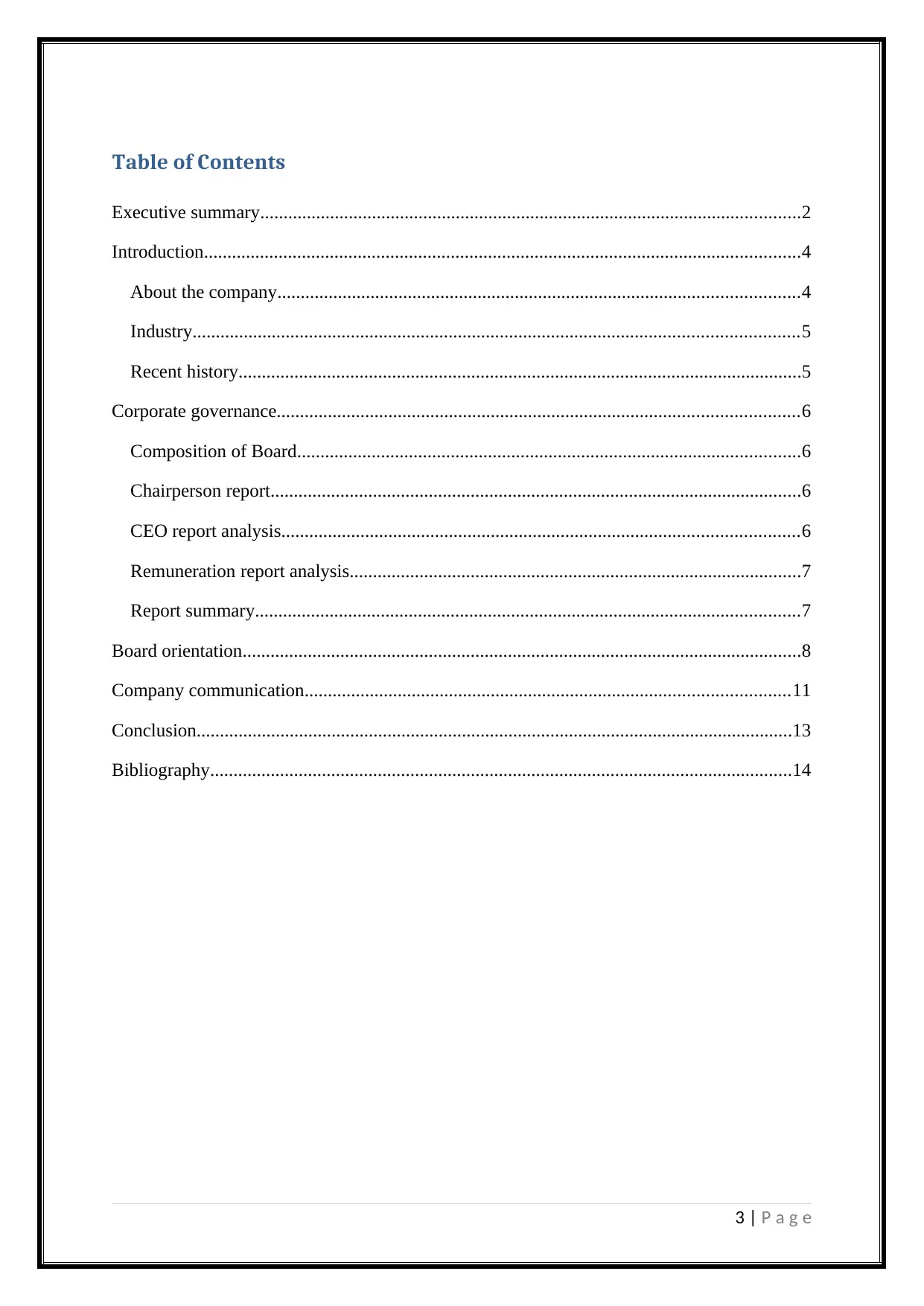
Table of Contents
Executive summary....................................................................................................................2
Introduction................................................................................................................................4
About the company................................................................................................................4
Industry..................................................................................................................................5
Recent history.........................................................................................................................5
Corporate governance................................................................................................................6
Composition of Board............................................................................................................6
Chairperson report..................................................................................................................6
CEO report analysis...............................................................................................................6
Remuneration report analysis.................................................................................................7
Report summary.....................................................................................................................7
Board orientation........................................................................................................................8
Company communication........................................................................................................11
Conclusion................................................................................................................................13
Bibliography.............................................................................................................................14
3 | P a g e
Executive summary....................................................................................................................2
Introduction................................................................................................................................4
About the company................................................................................................................4
Industry..................................................................................................................................5
Recent history.........................................................................................................................5
Corporate governance................................................................................................................6
Composition of Board............................................................................................................6
Chairperson report..................................................................................................................6
CEO report analysis...............................................................................................................6
Remuneration report analysis.................................................................................................7
Report summary.....................................................................................................................7
Board orientation........................................................................................................................8
Company communication........................................................................................................11
Conclusion................................................................................................................................13
Bibliography.............................................................................................................................14
3 | P a g e
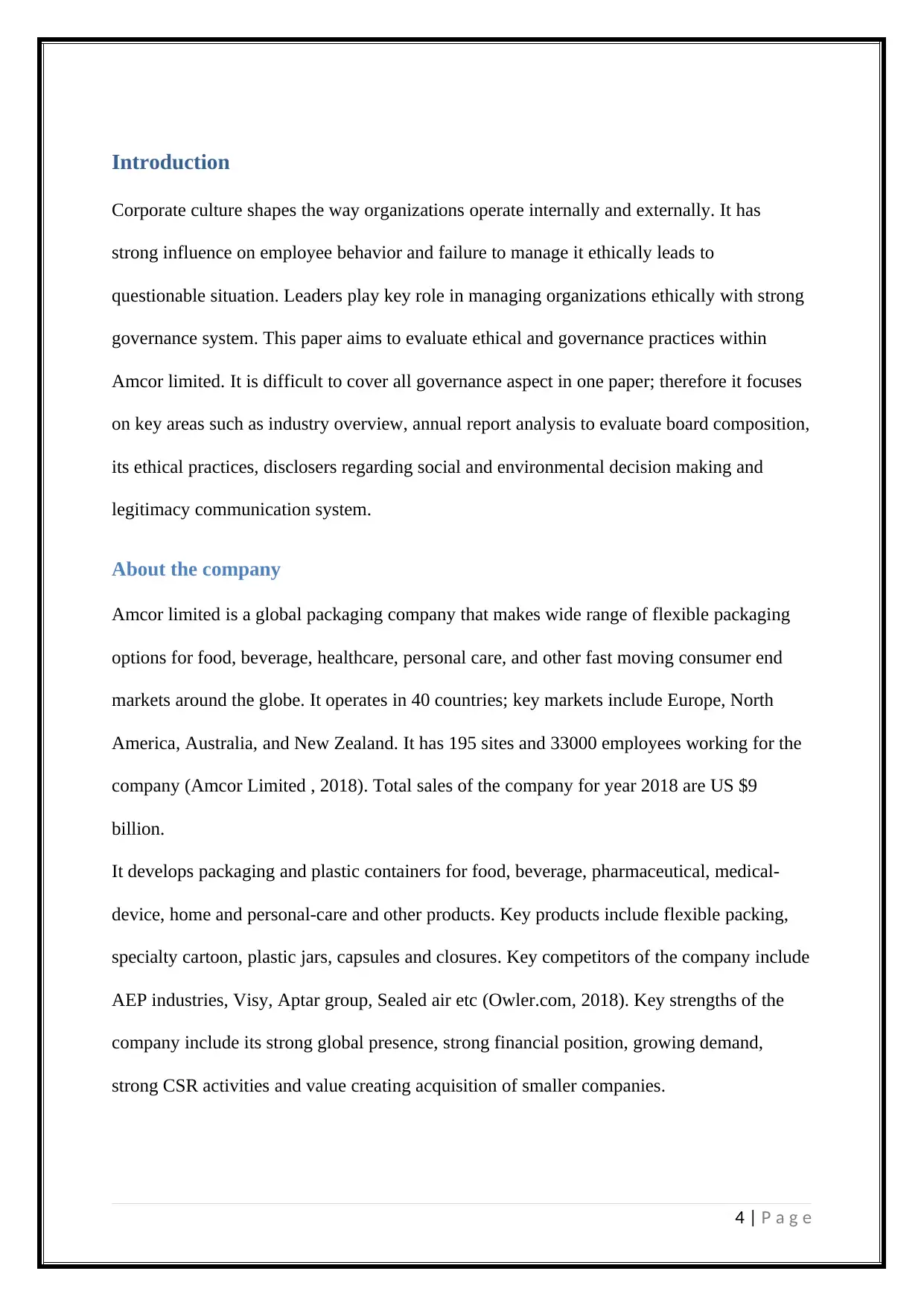
Introduction
Corporate culture shapes the way organizations operate internally and externally. It has
strong influence on employee behavior and failure to manage it ethically leads to
questionable situation. Leaders play key role in managing organizations ethically with strong
governance system. This paper aims to evaluate ethical and governance practices within
Amcor limited. It is difficult to cover all governance aspect in one paper; therefore it focuses
on key areas such as industry overview, annual report analysis to evaluate board composition,
its ethical practices, disclosers regarding social and environmental decision making and
legitimacy communication system.
About the company
Amcor limited is a global packaging company that makes wide range of flexible packaging
options for food, beverage, healthcare, personal care, and other fast moving consumer end
markets around the globe. It operates in 40 countries; key markets include Europe, North
America, Australia, and New Zealand. It has 195 sites and 33000 employees working for the
company (Amcor Limited , 2018). Total sales of the company for year 2018 are US $9
billion.
It develops packaging and plastic containers for food, beverage, pharmaceutical, medical-
device, home and personal-care and other products. Key products include flexible packing,
specialty cartoon, plastic jars, capsules and closures. Key competitors of the company include
AEP industries, Visy, Aptar group, Sealed air etc (Owler.com, 2018). Key strengths of the
company include its strong global presence, strong financial position, growing demand,
strong CSR activities and value creating acquisition of smaller companies.
4 | P a g e
Corporate culture shapes the way organizations operate internally and externally. It has
strong influence on employee behavior and failure to manage it ethically leads to
questionable situation. Leaders play key role in managing organizations ethically with strong
governance system. This paper aims to evaluate ethical and governance practices within
Amcor limited. It is difficult to cover all governance aspect in one paper; therefore it focuses
on key areas such as industry overview, annual report analysis to evaluate board composition,
its ethical practices, disclosers regarding social and environmental decision making and
legitimacy communication system.
About the company
Amcor limited is a global packaging company that makes wide range of flexible packaging
options for food, beverage, healthcare, personal care, and other fast moving consumer end
markets around the globe. It operates in 40 countries; key markets include Europe, North
America, Australia, and New Zealand. It has 195 sites and 33000 employees working for the
company (Amcor Limited , 2018). Total sales of the company for year 2018 are US $9
billion.
It develops packaging and plastic containers for food, beverage, pharmaceutical, medical-
device, home and personal-care and other products. Key products include flexible packing,
specialty cartoon, plastic jars, capsules and closures. Key competitors of the company include
AEP industries, Visy, Aptar group, Sealed air etc (Owler.com, 2018). Key strengths of the
company include its strong global presence, strong financial position, growing demand,
strong CSR activities and value creating acquisition of smaller companies.
4 | P a g e
Secure Best Marks with AI Grader
Need help grading? Try our AI Grader for instant feedback on your assignments.
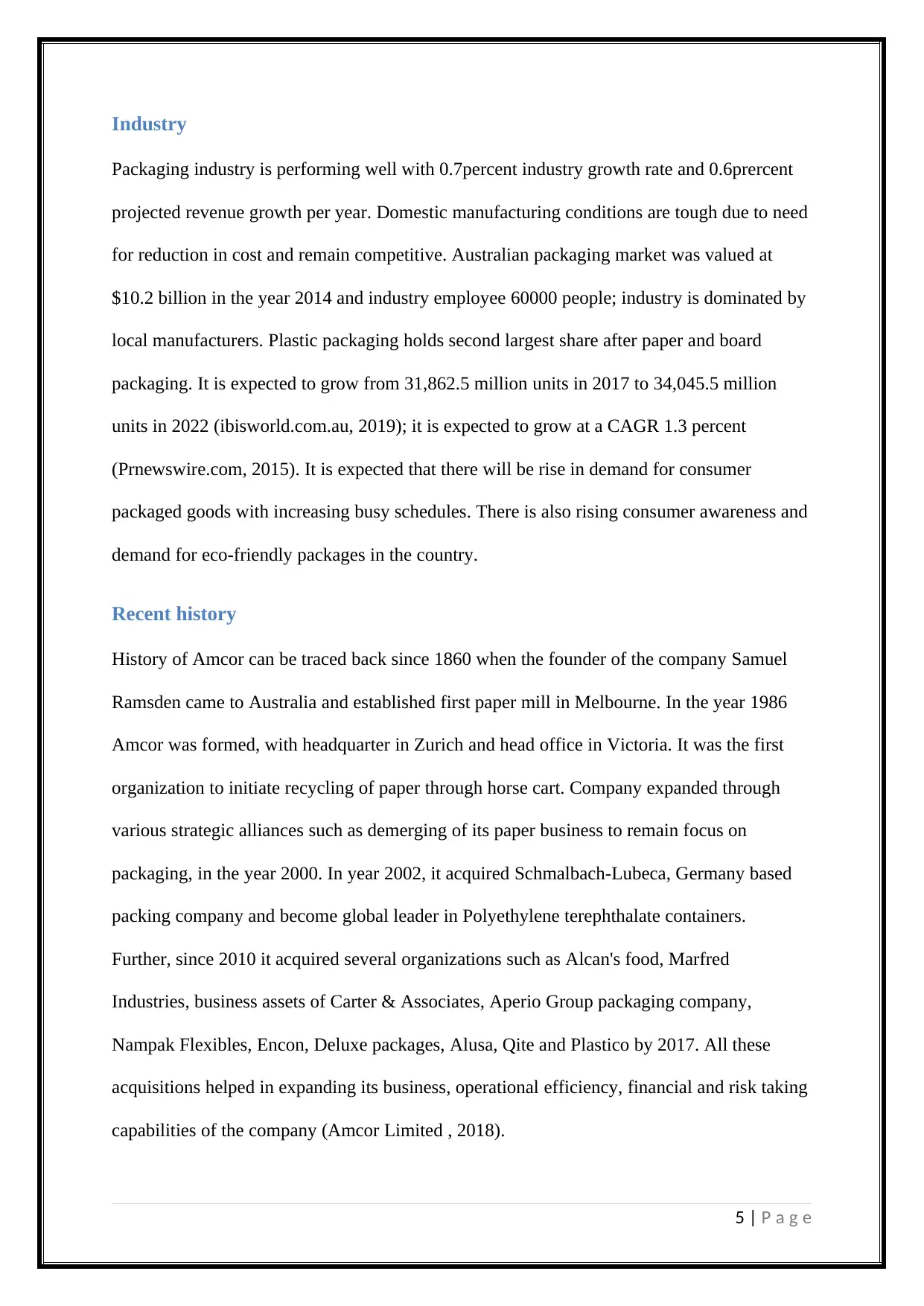
Industry
Packaging industry is performing well with 0.7percent industry growth rate and 0.6prercent
projected revenue growth per year. Domestic manufacturing conditions are tough due to need
for reduction in cost and remain competitive. Australian packaging market was valued at
$10.2 billion in the year 2014 and industry employee 60000 people; industry is dominated by
local manufacturers. Plastic packaging holds second largest share after paper and board
packaging. It is expected to grow from 31,862.5 million units in 2017 to 34,045.5 million
units in 2022 (ibisworld.com.au, 2019); it is expected to grow at a CAGR 1.3 percent
(Prnewswire.com, 2015). It is expected that there will be rise in demand for consumer
packaged goods with increasing busy schedules. There is also rising consumer awareness and
demand for eco-friendly packages in the country.
Recent history
History of Amcor can be traced back since 1860 when the founder of the company Samuel
Ramsden came to Australia and established first paper mill in Melbourne. In the year 1986
Amcor was formed, with headquarter in Zurich and head office in Victoria. It was the first
organization to initiate recycling of paper through horse cart. Company expanded through
various strategic alliances such as demerging of its paper business to remain focus on
packaging, in the year 2000. In year 2002, it acquired Schmalbach-Lubeca, Germany based
packing company and become global leader in Polyethylene terephthalate containers.
Further, since 2010 it acquired several organizations such as Alcan's food, Marfred
Industries, business assets of Carter & Associates, Aperio Group packaging company,
Nampak Flexibles, Encon, Deluxe packages, Alusa, Qite and Plastico by 2017. All these
acquisitions helped in expanding its business, operational efficiency, financial and risk taking
capabilities of the company (Amcor Limited , 2018).
5 | P a g e
Packaging industry is performing well with 0.7percent industry growth rate and 0.6prercent
projected revenue growth per year. Domestic manufacturing conditions are tough due to need
for reduction in cost and remain competitive. Australian packaging market was valued at
$10.2 billion in the year 2014 and industry employee 60000 people; industry is dominated by
local manufacturers. Plastic packaging holds second largest share after paper and board
packaging. It is expected to grow from 31,862.5 million units in 2017 to 34,045.5 million
units in 2022 (ibisworld.com.au, 2019); it is expected to grow at a CAGR 1.3 percent
(Prnewswire.com, 2015). It is expected that there will be rise in demand for consumer
packaged goods with increasing busy schedules. There is also rising consumer awareness and
demand for eco-friendly packages in the country.
Recent history
History of Amcor can be traced back since 1860 when the founder of the company Samuel
Ramsden came to Australia and established first paper mill in Melbourne. In the year 1986
Amcor was formed, with headquarter in Zurich and head office in Victoria. It was the first
organization to initiate recycling of paper through horse cart. Company expanded through
various strategic alliances such as demerging of its paper business to remain focus on
packaging, in the year 2000. In year 2002, it acquired Schmalbach-Lubeca, Germany based
packing company and become global leader in Polyethylene terephthalate containers.
Further, since 2010 it acquired several organizations such as Alcan's food, Marfred
Industries, business assets of Carter & Associates, Aperio Group packaging company,
Nampak Flexibles, Encon, Deluxe packages, Alusa, Qite and Plastico by 2017. All these
acquisitions helped in expanding its business, operational efficiency, financial and risk taking
capabilities of the company (Amcor Limited , 2018).
5 | P a g e
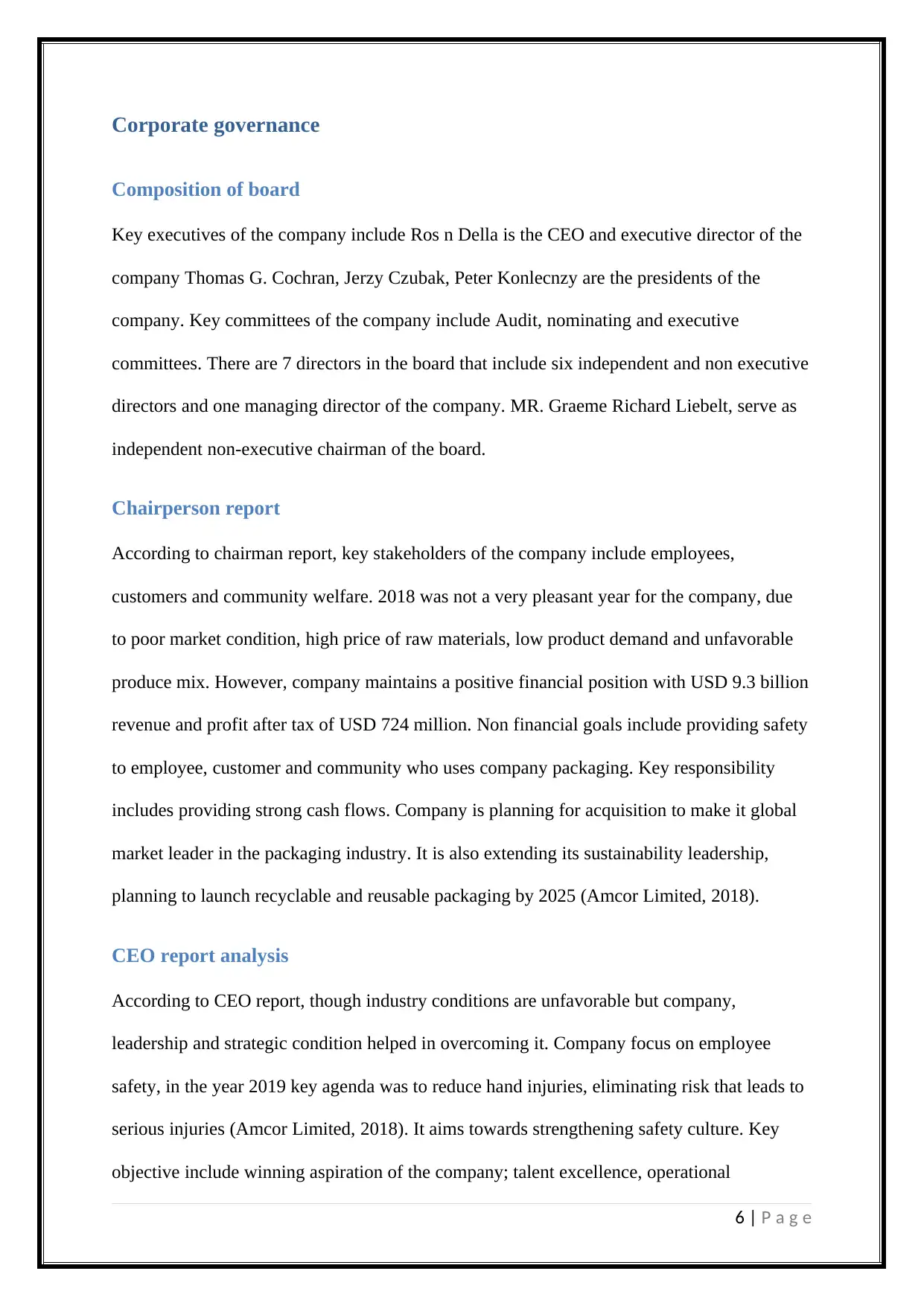
Corporate governance
Composition of board
Key executives of the company include Ros n Della is the CEO and executive director of the
company Thomas G. Cochran, Jerzy Czubak, Peter Konlecnzy are the presidents of the
company. Key committees of the company include Audit, nominating and executive
committees. There are 7 directors in the board that include six independent and non executive
directors and one managing director of the company. MR. Graeme Richard Liebelt, serve as
independent non-executive chairman of the board.
Chairperson report
According to chairman report, key stakeholders of the company include employees,
customers and community welfare. 2018 was not a very pleasant year for the company, due
to poor market condition, high price of raw materials, low product demand and unfavorable
produce mix. However, company maintains a positive financial position with USD 9.3 billion
revenue and profit after tax of USD 724 million. Non financial goals include providing safety
to employee, customer and community who uses company packaging. Key responsibility
includes providing strong cash flows. Company is planning for acquisition to make it global
market leader in the packaging industry. It is also extending its sustainability leadership,
planning to launch recyclable and reusable packaging by 2025 (Amcor Limited, 2018).
CEO report analysis
According to CEO report, though industry conditions are unfavorable but company,
leadership and strategic condition helped in overcoming it. Company focus on employee
safety, in the year 2019 key agenda was to reduce hand injuries, eliminating risk that leads to
serious injuries (Amcor Limited, 2018). It aims towards strengthening safety culture. Key
objective include winning aspiration of the company; talent excellence, operational
6 | P a g e
Composition of board
Key executives of the company include Ros n Della is the CEO and executive director of the
company Thomas G. Cochran, Jerzy Czubak, Peter Konlecnzy are the presidents of the
company. Key committees of the company include Audit, nominating and executive
committees. There are 7 directors in the board that include six independent and non executive
directors and one managing director of the company. MR. Graeme Richard Liebelt, serve as
independent non-executive chairman of the board.
Chairperson report
According to chairman report, key stakeholders of the company include employees,
customers and community welfare. 2018 was not a very pleasant year for the company, due
to poor market condition, high price of raw materials, low product demand and unfavorable
produce mix. However, company maintains a positive financial position with USD 9.3 billion
revenue and profit after tax of USD 724 million. Non financial goals include providing safety
to employee, customer and community who uses company packaging. Key responsibility
includes providing strong cash flows. Company is planning for acquisition to make it global
market leader in the packaging industry. It is also extending its sustainability leadership,
planning to launch recyclable and reusable packaging by 2025 (Amcor Limited, 2018).
CEO report analysis
According to CEO report, though industry conditions are unfavorable but company,
leadership and strategic condition helped in overcoming it. Company focus on employee
safety, in the year 2019 key agenda was to reduce hand injuries, eliminating risk that leads to
serious injuries (Amcor Limited, 2018). It aims towards strengthening safety culture. Key
objective include winning aspiration of the company; talent excellence, operational
6 | P a g e
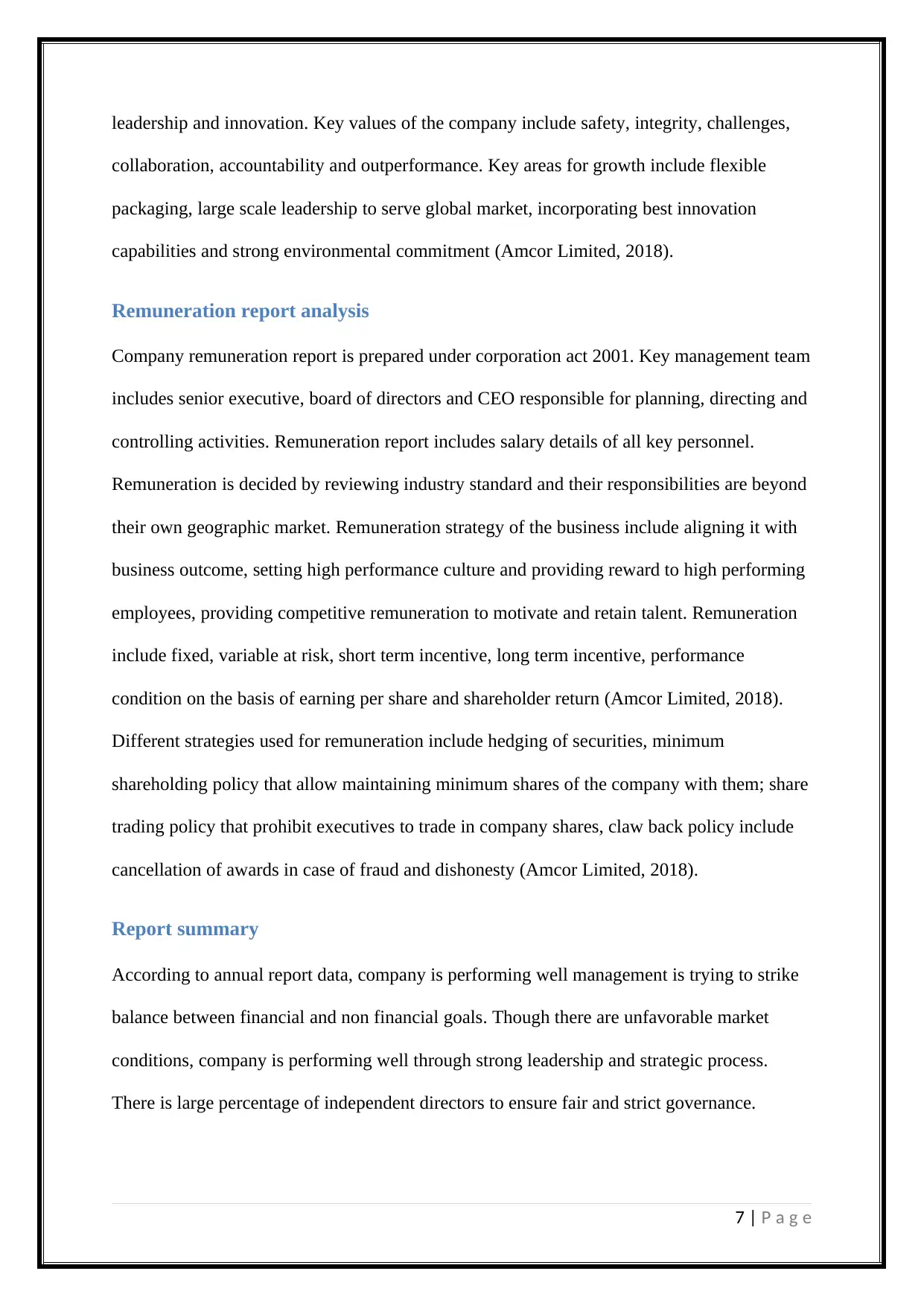
leadership and innovation. Key values of the company include safety, integrity, challenges,
collaboration, accountability and outperformance. Key areas for growth include flexible
packaging, large scale leadership to serve global market, incorporating best innovation
capabilities and strong environmental commitment (Amcor Limited, 2018).
Remuneration report analysis
Company remuneration report is prepared under corporation act 2001. Key management team
includes senior executive, board of directors and CEO responsible for planning, directing and
controlling activities. Remuneration report includes salary details of all key personnel.
Remuneration is decided by reviewing industry standard and their responsibilities are beyond
their own geographic market. Remuneration strategy of the business include aligning it with
business outcome, setting high performance culture and providing reward to high performing
employees, providing competitive remuneration to motivate and retain talent. Remuneration
include fixed, variable at risk, short term incentive, long term incentive, performance
condition on the basis of earning per share and shareholder return (Amcor Limited, 2018).
Different strategies used for remuneration include hedging of securities, minimum
shareholding policy that allow maintaining minimum shares of the company with them; share
trading policy that prohibit executives to trade in company shares, claw back policy include
cancellation of awards in case of fraud and dishonesty (Amcor Limited, 2018).
Report summary
According to annual report data, company is performing well management is trying to strike
balance between financial and non financial goals. Though there are unfavorable market
conditions, company is performing well through strong leadership and strategic process.
There is large percentage of independent directors to ensure fair and strict governance.
7 | P a g e
collaboration, accountability and outperformance. Key areas for growth include flexible
packaging, large scale leadership to serve global market, incorporating best innovation
capabilities and strong environmental commitment (Amcor Limited, 2018).
Remuneration report analysis
Company remuneration report is prepared under corporation act 2001. Key management team
includes senior executive, board of directors and CEO responsible for planning, directing and
controlling activities. Remuneration report includes salary details of all key personnel.
Remuneration is decided by reviewing industry standard and their responsibilities are beyond
their own geographic market. Remuneration strategy of the business include aligning it with
business outcome, setting high performance culture and providing reward to high performing
employees, providing competitive remuneration to motivate and retain talent. Remuneration
include fixed, variable at risk, short term incentive, long term incentive, performance
condition on the basis of earning per share and shareholder return (Amcor Limited, 2018).
Different strategies used for remuneration include hedging of securities, minimum
shareholding policy that allow maintaining minimum shares of the company with them; share
trading policy that prohibit executives to trade in company shares, claw back policy include
cancellation of awards in case of fraud and dishonesty (Amcor Limited, 2018).
Report summary
According to annual report data, company is performing well management is trying to strike
balance between financial and non financial goals. Though there are unfavorable market
conditions, company is performing well through strong leadership and strategic process.
There is large percentage of independent directors to ensure fair and strict governance.
7 | P a g e
Paraphrase This Document
Need a fresh take? Get an instant paraphrase of this document with our AI Paraphraser
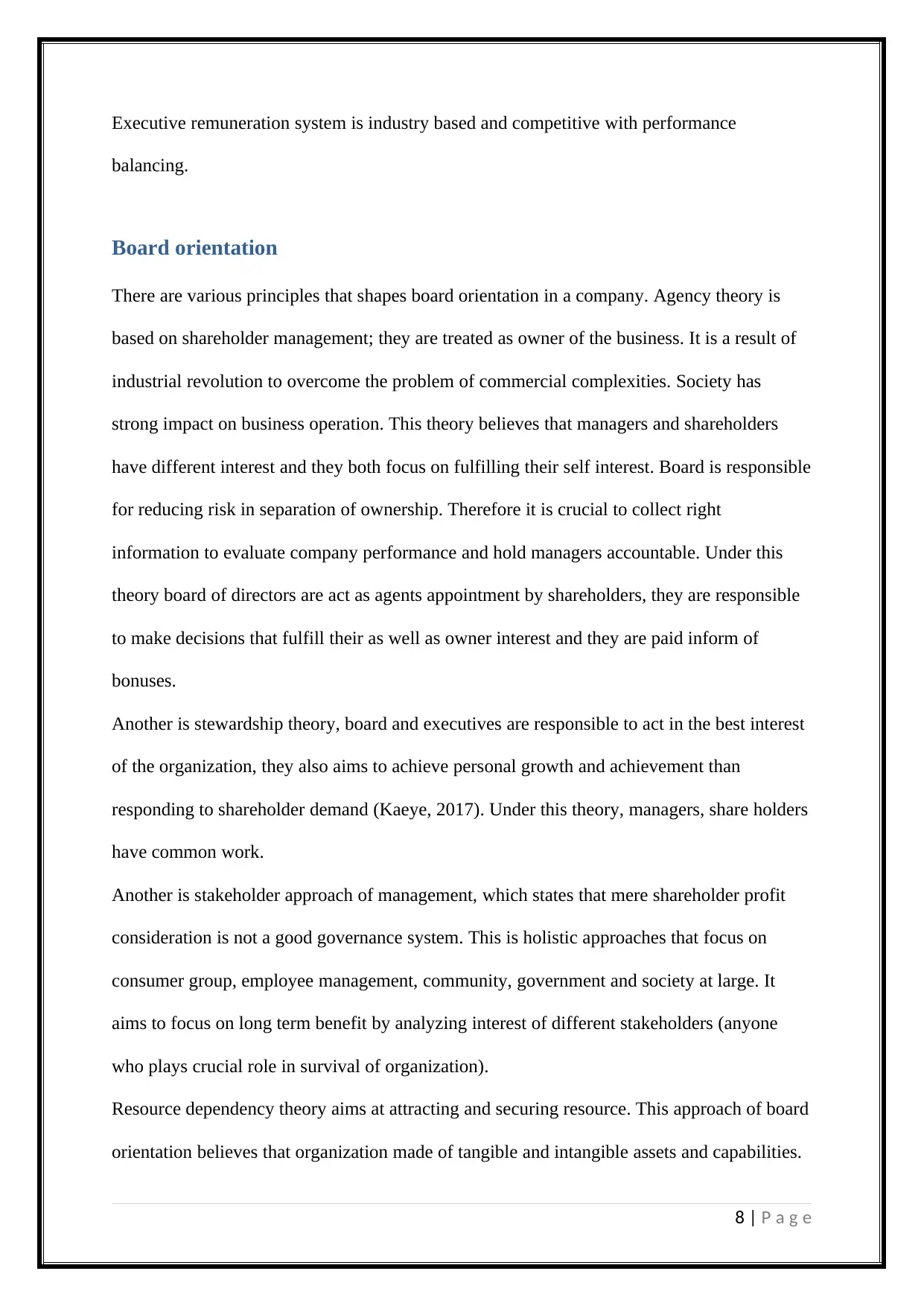
Executive remuneration system is industry based and competitive with performance
balancing.
Board orientation
There are various principles that shapes board orientation in a company. Agency theory is
based on shareholder management; they are treated as owner of the business. It is a result of
industrial revolution to overcome the problem of commercial complexities. Society has
strong impact on business operation. This theory believes that managers and shareholders
have different interest and they both focus on fulfilling their self interest. Board is responsible
for reducing risk in separation of ownership. Therefore it is crucial to collect right
information to evaluate company performance and hold managers accountable. Under this
theory board of directors are act as agents appointment by shareholders, they are responsible
to make decisions that fulfill their as well as owner interest and they are paid inform of
bonuses.
Another is stewardship theory, board and executives are responsible to act in the best interest
of the organization, they also aims to achieve personal growth and achievement than
responding to shareholder demand (Kaeye, 2017). Under this theory, managers, share holders
have common work.
Another is stakeholder approach of management, which states that mere shareholder profit
consideration is not a good governance system. This is holistic approaches that focus on
consumer group, employee management, community, government and society at large. It
aims to focus on long term benefit by analyzing interest of different stakeholders (anyone
who plays crucial role in survival of organization).
Resource dependency theory aims at attracting and securing resource. This approach of board
orientation believes that organization made of tangible and intangible assets and capabilities.
8 | P a g e
balancing.
Board orientation
There are various principles that shapes board orientation in a company. Agency theory is
based on shareholder management; they are treated as owner of the business. It is a result of
industrial revolution to overcome the problem of commercial complexities. Society has
strong impact on business operation. This theory believes that managers and shareholders
have different interest and they both focus on fulfilling their self interest. Board is responsible
for reducing risk in separation of ownership. Therefore it is crucial to collect right
information to evaluate company performance and hold managers accountable. Under this
theory board of directors are act as agents appointment by shareholders, they are responsible
to make decisions that fulfill their as well as owner interest and they are paid inform of
bonuses.
Another is stewardship theory, board and executives are responsible to act in the best interest
of the organization, they also aims to achieve personal growth and achievement than
responding to shareholder demand (Kaeye, 2017). Under this theory, managers, share holders
have common work.
Another is stakeholder approach of management, which states that mere shareholder profit
consideration is not a good governance system. This is holistic approaches that focus on
consumer group, employee management, community, government and society at large. It
aims to focus on long term benefit by analyzing interest of different stakeholders (anyone
who plays crucial role in survival of organization).
Resource dependency theory aims at attracting and securing resource. This approach of board
orientation believes that organization made of tangible and intangible assets and capabilities.
8 | P a g e
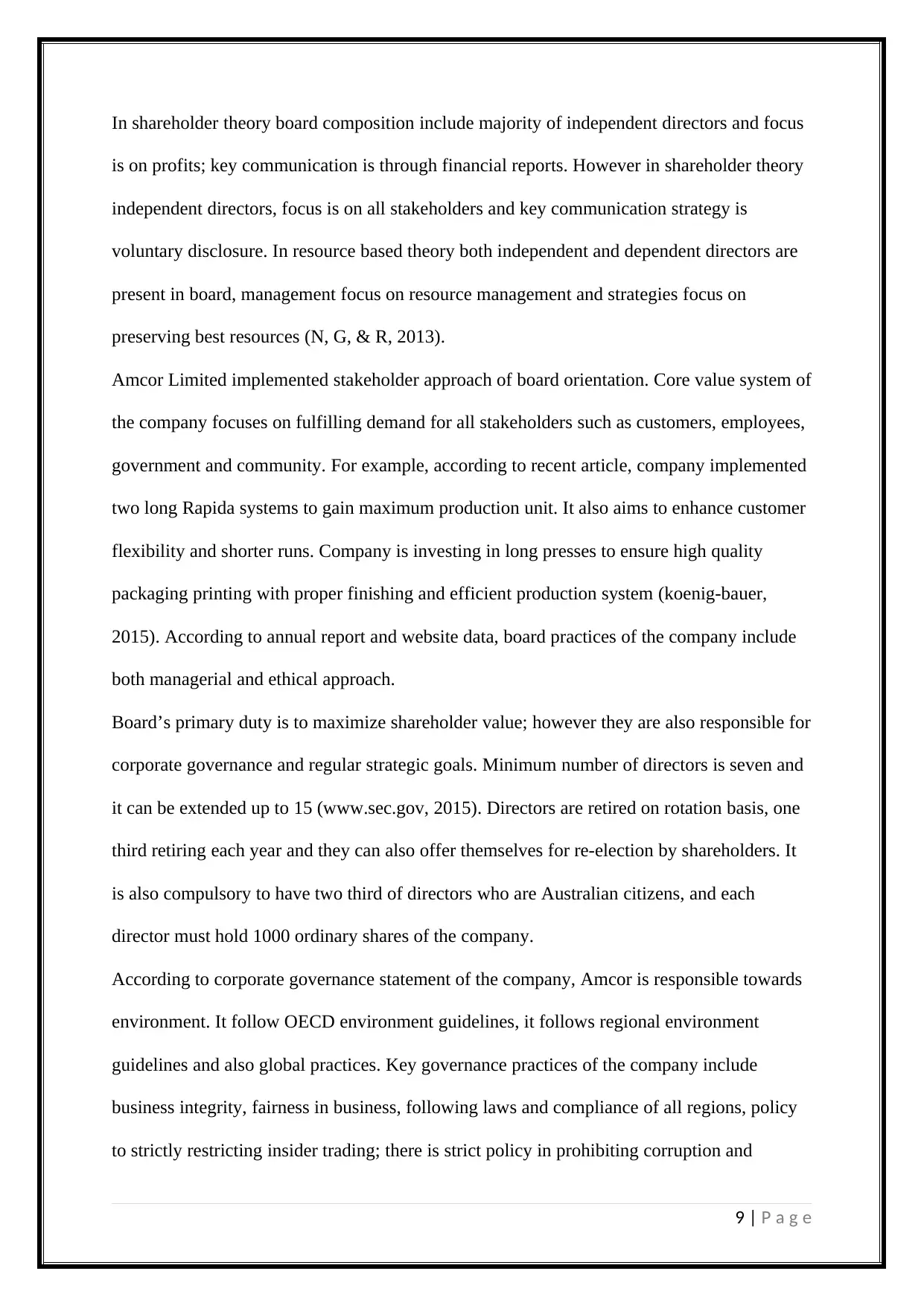
In shareholder theory board composition include majority of independent directors and focus
is on profits; key communication is through financial reports. However in shareholder theory
independent directors, focus is on all stakeholders and key communication strategy is
voluntary disclosure. In resource based theory both independent and dependent directors are
present in board, management focus on resource management and strategies focus on
preserving best resources (N, G, & R, 2013).
Amcor Limited implemented stakeholder approach of board orientation. Core value system of
the company focuses on fulfilling demand for all stakeholders such as customers, employees,
government and community. For example, according to recent article, company implemented
two long Rapida systems to gain maximum production unit. It also aims to enhance customer
flexibility and shorter runs. Company is investing in long presses to ensure high quality
packaging printing with proper finishing and efficient production system (koenig-bauer,
2015). According to annual report and website data, board practices of the company include
both managerial and ethical approach.
Board’s primary duty is to maximize shareholder value; however they are also responsible for
corporate governance and regular strategic goals. Minimum number of directors is seven and
it can be extended up to 15 (www.sec.gov, 2015). Directors are retired on rotation basis, one
third retiring each year and they can also offer themselves for re-election by shareholders. It
is also compulsory to have two third of directors who are Australian citizens, and each
director must hold 1000 ordinary shares of the company.
According to corporate governance statement of the company, Amcor is responsible towards
environment. It follow OECD environment guidelines, it follows regional environment
guidelines and also global practices. Key governance practices of the company include
business integrity, fairness in business, following laws and compliance of all regions, policy
to strictly restricting insider trading; there is strict policy in prohibiting corruption and
9 | P a g e
is on profits; key communication is through financial reports. However in shareholder theory
independent directors, focus is on all stakeholders and key communication strategy is
voluntary disclosure. In resource based theory both independent and dependent directors are
present in board, management focus on resource management and strategies focus on
preserving best resources (N, G, & R, 2013).
Amcor Limited implemented stakeholder approach of board orientation. Core value system of
the company focuses on fulfilling demand for all stakeholders such as customers, employees,
government and community. For example, according to recent article, company implemented
two long Rapida systems to gain maximum production unit. It also aims to enhance customer
flexibility and shorter runs. Company is investing in long presses to ensure high quality
packaging printing with proper finishing and efficient production system (koenig-bauer,
2015). According to annual report and website data, board practices of the company include
both managerial and ethical approach.
Board’s primary duty is to maximize shareholder value; however they are also responsible for
corporate governance and regular strategic goals. Minimum number of directors is seven and
it can be extended up to 15 (www.sec.gov, 2015). Directors are retired on rotation basis, one
third retiring each year and they can also offer themselves for re-election by shareholders. It
is also compulsory to have two third of directors who are Australian citizens, and each
director must hold 1000 ordinary shares of the company.
According to corporate governance statement of the company, Amcor is responsible towards
environment. It follow OECD environment guidelines, it follows regional environment
guidelines and also global practices. Key governance practices of the company include
business integrity, fairness in business, following laws and compliance of all regions, policy
to strictly restricting insider trading; there is strict policy in prohibiting corruption and
9 | P a g e
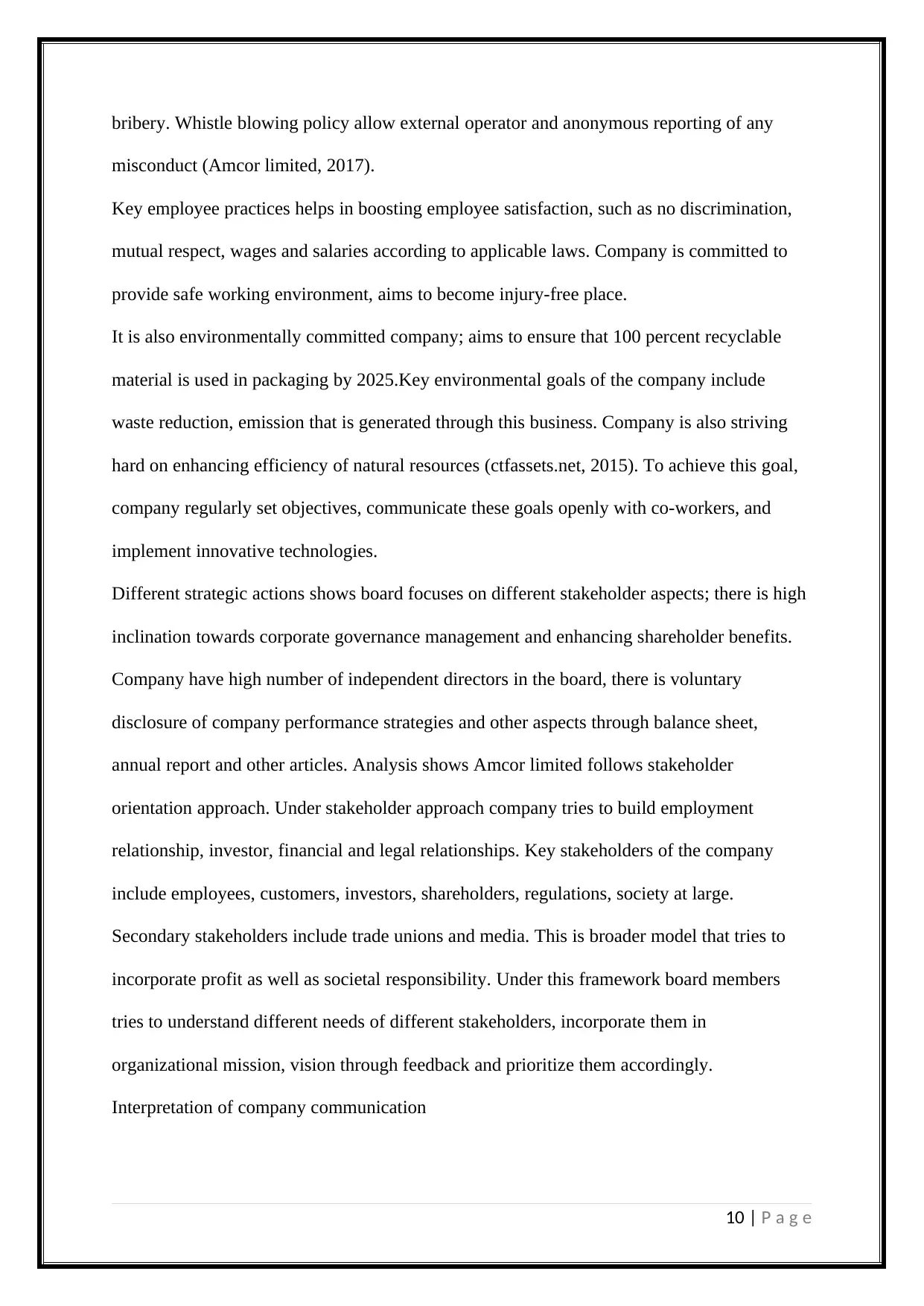
bribery. Whistle blowing policy allow external operator and anonymous reporting of any
misconduct (Amcor limited, 2017).
Key employee practices helps in boosting employee satisfaction, such as no discrimination,
mutual respect, wages and salaries according to applicable laws. Company is committed to
provide safe working environment, aims to become injury-free place.
It is also environmentally committed company; aims to ensure that 100 percent recyclable
material is used in packaging by 2025.Key environmental goals of the company include
waste reduction, emission that is generated through this business. Company is also striving
hard on enhancing efficiency of natural resources (ctfassets.net, 2015). To achieve this goal,
company regularly set objectives, communicate these goals openly with co-workers, and
implement innovative technologies.
Different strategic actions shows board focuses on different stakeholder aspects; there is high
inclination towards corporate governance management and enhancing shareholder benefits.
Company have high number of independent directors in the board, there is voluntary
disclosure of company performance strategies and other aspects through balance sheet,
annual report and other articles. Analysis shows Amcor limited follows stakeholder
orientation approach. Under stakeholder approach company tries to build employment
relationship, investor, financial and legal relationships. Key stakeholders of the company
include employees, customers, investors, shareholders, regulations, society at large.
Secondary stakeholders include trade unions and media. This is broader model that tries to
incorporate profit as well as societal responsibility. Under this framework board members
tries to understand different needs of different stakeholders, incorporate them in
organizational mission, vision through feedback and prioritize them accordingly.
Interpretation of company communication
10 | P a g e
misconduct (Amcor limited, 2017).
Key employee practices helps in boosting employee satisfaction, such as no discrimination,
mutual respect, wages and salaries according to applicable laws. Company is committed to
provide safe working environment, aims to become injury-free place.
It is also environmentally committed company; aims to ensure that 100 percent recyclable
material is used in packaging by 2025.Key environmental goals of the company include
waste reduction, emission that is generated through this business. Company is also striving
hard on enhancing efficiency of natural resources (ctfassets.net, 2015). To achieve this goal,
company regularly set objectives, communicate these goals openly with co-workers, and
implement innovative technologies.
Different strategic actions shows board focuses on different stakeholder aspects; there is high
inclination towards corporate governance management and enhancing shareholder benefits.
Company have high number of independent directors in the board, there is voluntary
disclosure of company performance strategies and other aspects through balance sheet,
annual report and other articles. Analysis shows Amcor limited follows stakeholder
orientation approach. Under stakeholder approach company tries to build employment
relationship, investor, financial and legal relationships. Key stakeholders of the company
include employees, customers, investors, shareholders, regulations, society at large.
Secondary stakeholders include trade unions and media. This is broader model that tries to
incorporate profit as well as societal responsibility. Under this framework board members
tries to understand different needs of different stakeholders, incorporate them in
organizational mission, vision through feedback and prioritize them accordingly.
Interpretation of company communication
10 | P a g e
Secure Best Marks with AI Grader
Need help grading? Try our AI Grader for instant feedback on your assignments.
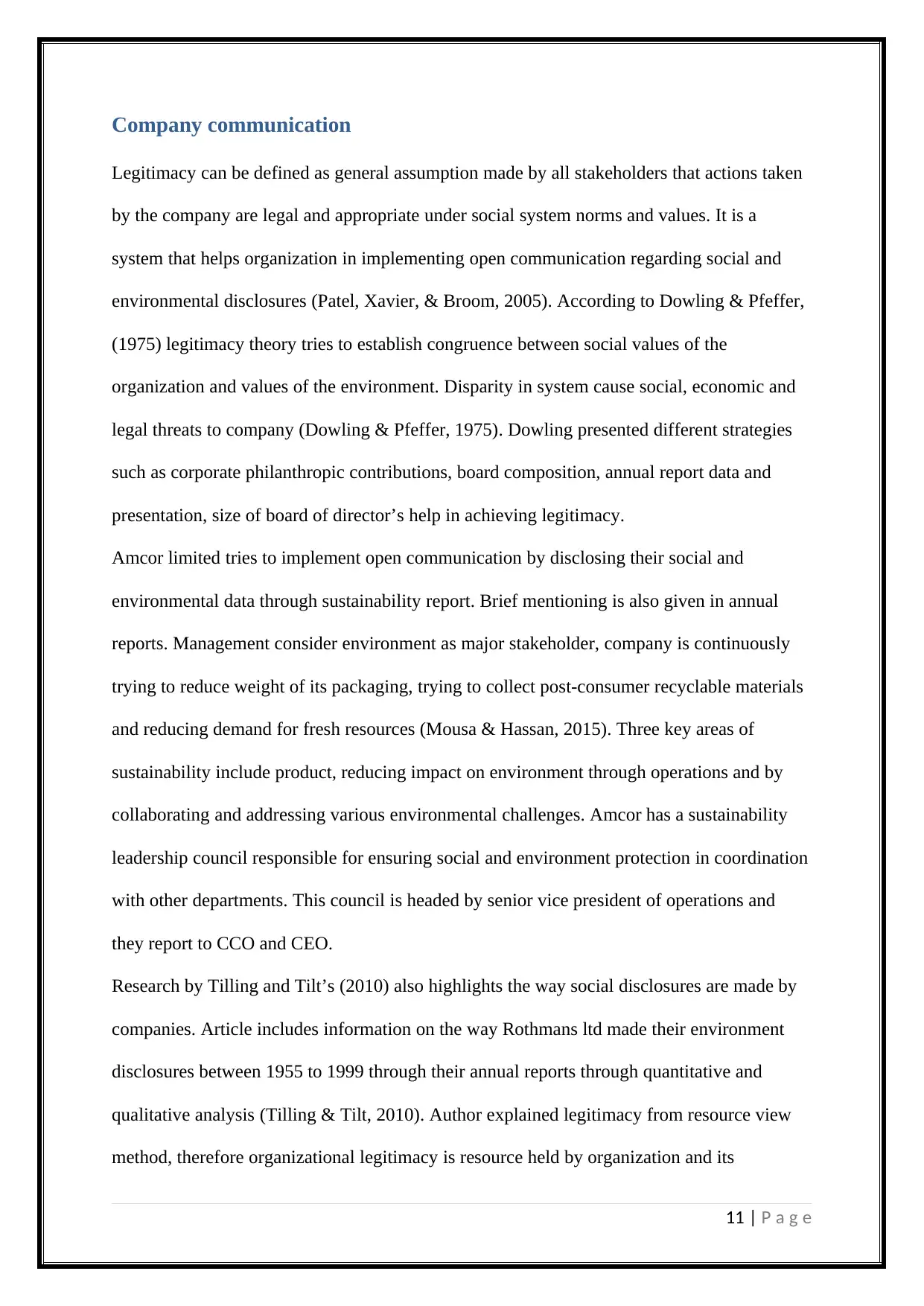
Company communication
Legitimacy can be defined as general assumption made by all stakeholders that actions taken
by the company are legal and appropriate under social system norms and values. It is a
system that helps organization in implementing open communication regarding social and
environmental disclosures (Patel, Xavier, & Broom, 2005). According to Dowling & Pfeffer,
(1975) legitimacy theory tries to establish congruence between social values of the
organization and values of the environment. Disparity in system cause social, economic and
legal threats to company (Dowling & Pfeffer, 1975). Dowling presented different strategies
such as corporate philanthropic contributions, board composition, annual report data and
presentation, size of board of director’s help in achieving legitimacy.
Amcor limited tries to implement open communication by disclosing their social and
environmental data through sustainability report. Brief mentioning is also given in annual
reports. Management consider environment as major stakeholder, company is continuously
trying to reduce weight of its packaging, trying to collect post-consumer recyclable materials
and reducing demand for fresh resources (Mousa & Hassan, 2015). Three key areas of
sustainability include product, reducing impact on environment through operations and by
collaborating and addressing various environmental challenges. Amcor has a sustainability
leadership council responsible for ensuring social and environment protection in coordination
with other departments. This council is headed by senior vice president of operations and
they report to CCO and CEO.
Research by Tilling and Tilt’s (2010) also highlights the way social disclosures are made by
companies. Article includes information on the way Rothmans ltd made their environment
disclosures between 1955 to 1999 through their annual reports through quantitative and
qualitative analysis (Tilling & Tilt, 2010). Author explained legitimacy from resource view
method, therefore organizational legitimacy is resource held by organization and its
11 | P a g e
Legitimacy can be defined as general assumption made by all stakeholders that actions taken
by the company are legal and appropriate under social system norms and values. It is a
system that helps organization in implementing open communication regarding social and
environmental disclosures (Patel, Xavier, & Broom, 2005). According to Dowling & Pfeffer,
(1975) legitimacy theory tries to establish congruence between social values of the
organization and values of the environment. Disparity in system cause social, economic and
legal threats to company (Dowling & Pfeffer, 1975). Dowling presented different strategies
such as corporate philanthropic contributions, board composition, annual report data and
presentation, size of board of director’s help in achieving legitimacy.
Amcor limited tries to implement open communication by disclosing their social and
environmental data through sustainability report. Brief mentioning is also given in annual
reports. Management consider environment as major stakeholder, company is continuously
trying to reduce weight of its packaging, trying to collect post-consumer recyclable materials
and reducing demand for fresh resources (Mousa & Hassan, 2015). Three key areas of
sustainability include product, reducing impact on environment through operations and by
collaborating and addressing various environmental challenges. Amcor has a sustainability
leadership council responsible for ensuring social and environment protection in coordination
with other departments. This council is headed by senior vice president of operations and
they report to CCO and CEO.
Research by Tilling and Tilt’s (2010) also highlights the way social disclosures are made by
companies. Article includes information on the way Rothmans ltd made their environment
disclosures between 1955 to 1999 through their annual reports through quantitative and
qualitative analysis (Tilling & Tilt, 2010). Author explained legitimacy from resource view
method, therefore organizational legitimacy is resource held by organization and its
11 | P a g e
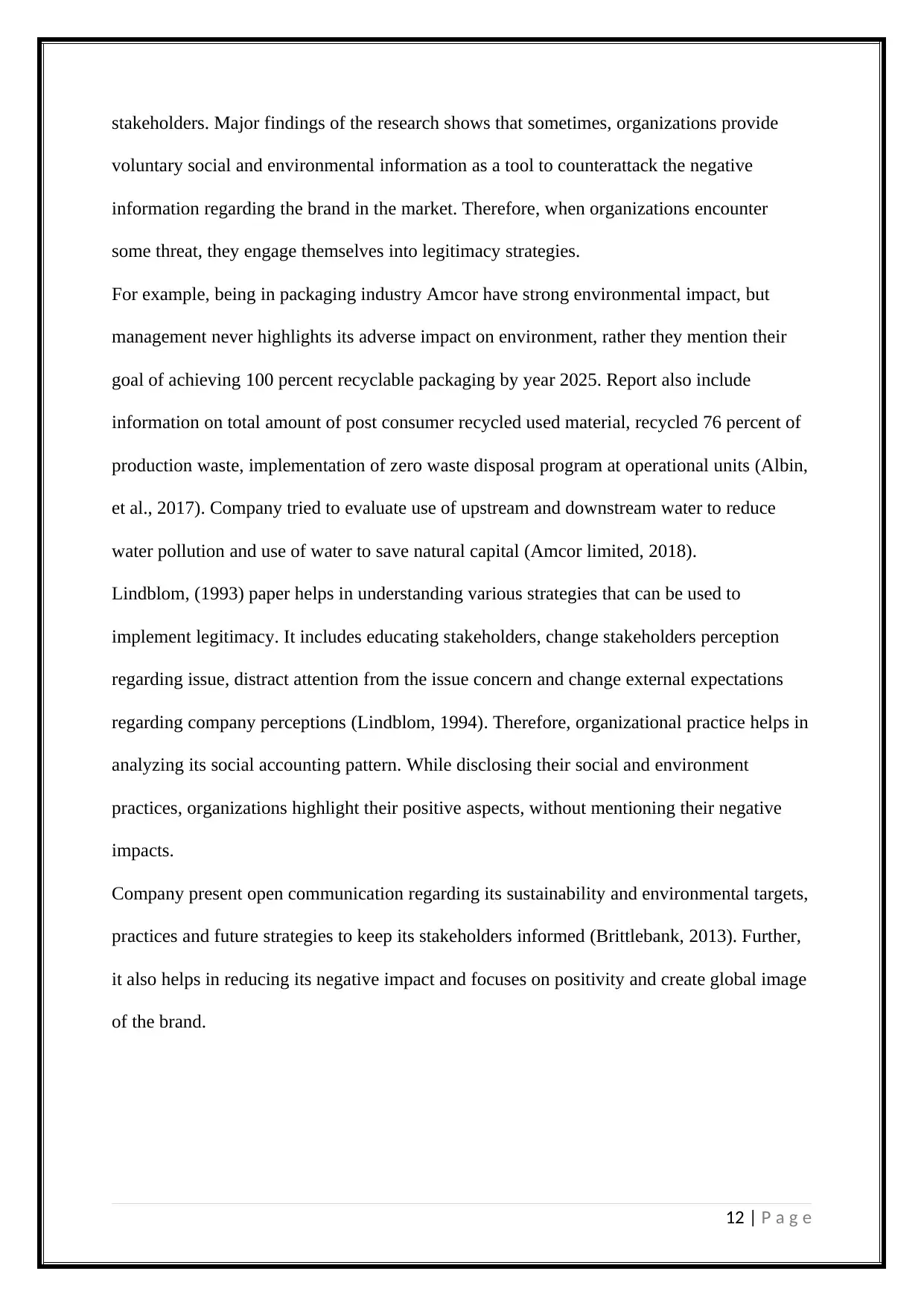
stakeholders. Major findings of the research shows that sometimes, organizations provide
voluntary social and environmental information as a tool to counterattack the negative
information regarding the brand in the market. Therefore, when organizations encounter
some threat, they engage themselves into legitimacy strategies.
For example, being in packaging industry Amcor have strong environmental impact, but
management never highlights its adverse impact on environment, rather they mention their
goal of achieving 100 percent recyclable packaging by year 2025. Report also include
information on total amount of post consumer recycled used material, recycled 76 percent of
production waste, implementation of zero waste disposal program at operational units (Albin,
et al., 2017). Company tried to evaluate use of upstream and downstream water to reduce
water pollution and use of water to save natural capital (Amcor limited, 2018).
Lindblom, (1993) paper helps in understanding various strategies that can be used to
implement legitimacy. It includes educating stakeholders, change stakeholders perception
regarding issue, distract attention from the issue concern and change external expectations
regarding company perceptions (Lindblom, 1994). Therefore, organizational practice helps in
analyzing its social accounting pattern. While disclosing their social and environment
practices, organizations highlight their positive aspects, without mentioning their negative
impacts.
Company present open communication regarding its sustainability and environmental targets,
practices and future strategies to keep its stakeholders informed (Brittlebank, 2013). Further,
it also helps in reducing its negative impact and focuses on positivity and create global image
of the brand.
12 | P a g e
voluntary social and environmental information as a tool to counterattack the negative
information regarding the brand in the market. Therefore, when organizations encounter
some threat, they engage themselves into legitimacy strategies.
For example, being in packaging industry Amcor have strong environmental impact, but
management never highlights its adverse impact on environment, rather they mention their
goal of achieving 100 percent recyclable packaging by year 2025. Report also include
information on total amount of post consumer recycled used material, recycled 76 percent of
production waste, implementation of zero waste disposal program at operational units (Albin,
et al., 2017). Company tried to evaluate use of upstream and downstream water to reduce
water pollution and use of water to save natural capital (Amcor limited, 2018).
Lindblom, (1993) paper helps in understanding various strategies that can be used to
implement legitimacy. It includes educating stakeholders, change stakeholders perception
regarding issue, distract attention from the issue concern and change external expectations
regarding company perceptions (Lindblom, 1994). Therefore, organizational practice helps in
analyzing its social accounting pattern. While disclosing their social and environment
practices, organizations highlight their positive aspects, without mentioning their negative
impacts.
Company present open communication regarding its sustainability and environmental targets,
practices and future strategies to keep its stakeholders informed (Brittlebank, 2013). Further,
it also helps in reducing its negative impact and focuses on positivity and create global image
of the brand.
12 | P a g e
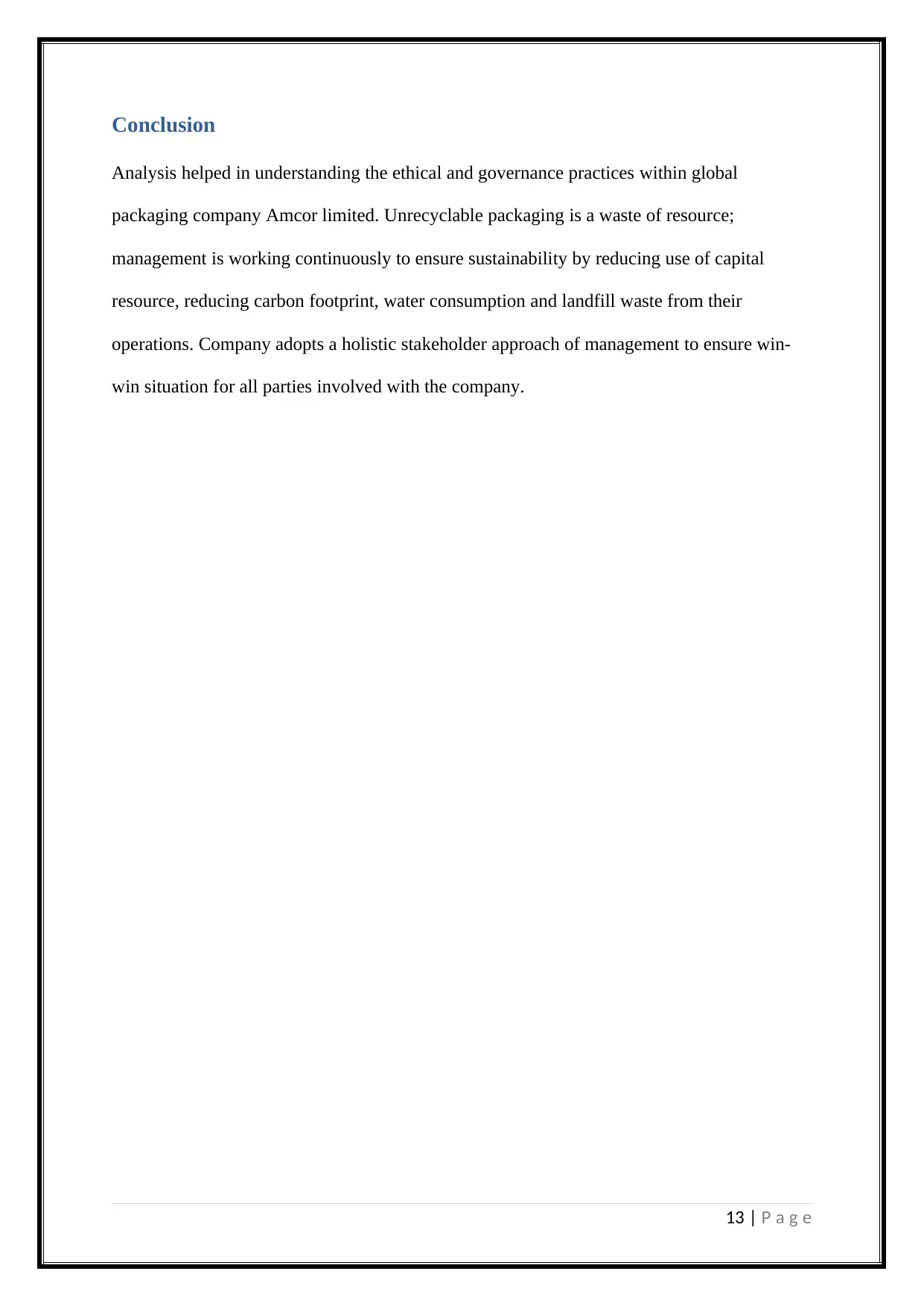
Conclusion
Analysis helped in understanding the ethical and governance practices within global
packaging company Amcor limited. Unrecyclable packaging is a waste of resource;
management is working continuously to ensure sustainability by reducing use of capital
resource, reducing carbon footprint, water consumption and landfill waste from their
operations. Company adopts a holistic stakeholder approach of management to ensure win-
win situation for all parties involved with the company.
13 | P a g e
Analysis helped in understanding the ethical and governance practices within global
packaging company Amcor limited. Unrecyclable packaging is a waste of resource;
management is working continuously to ensure sustainability by reducing use of capital
resource, reducing carbon footprint, water consumption and landfill waste from their
operations. Company adopts a holistic stakeholder approach of management to ensure win-
win situation for all parties involved with the company.
13 | P a g e
Paraphrase This Document
Need a fresh take? Get an instant paraphrase of this document with our AI Paraphraser
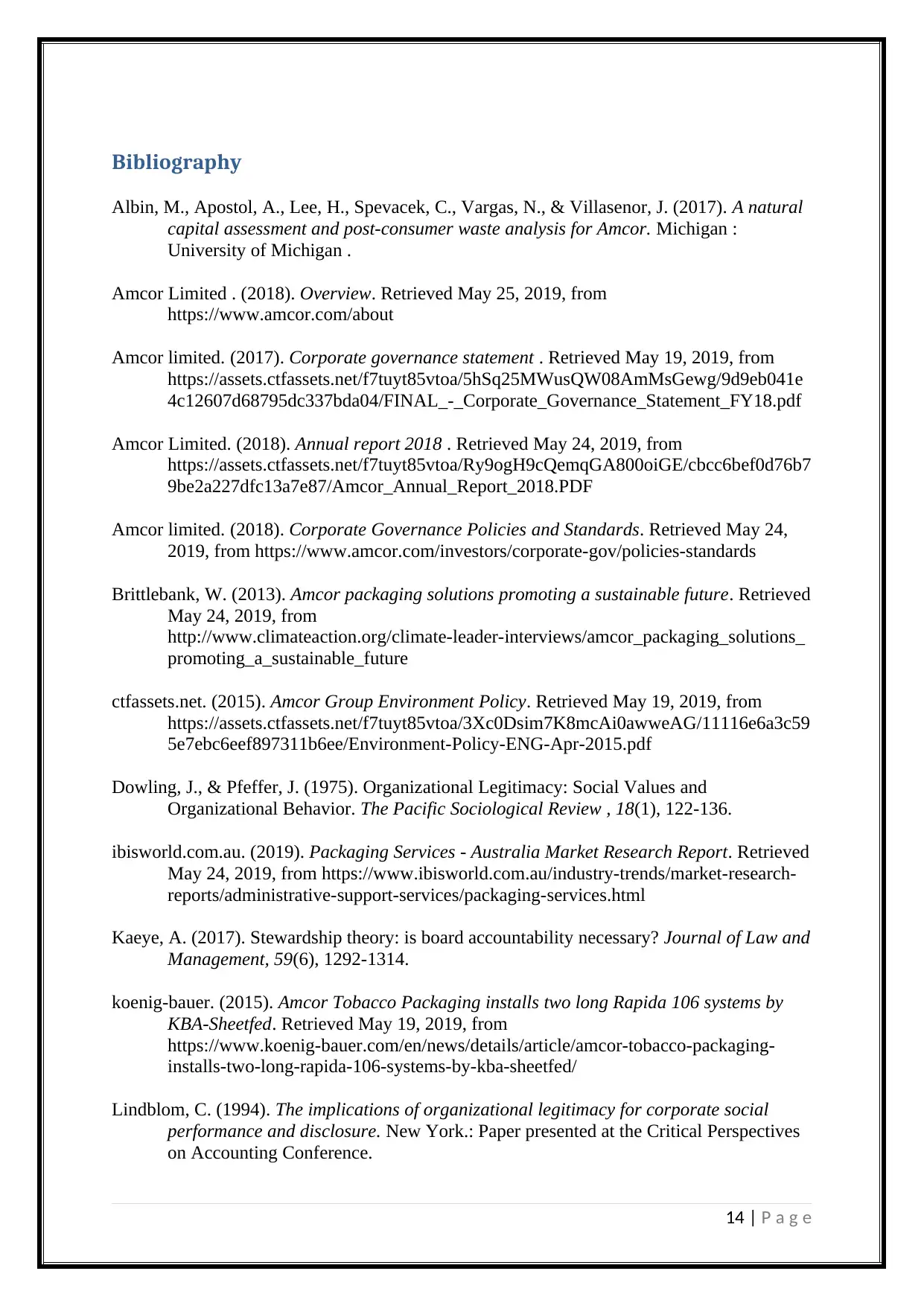
Bibliography
Albin, M., Apostol, A., Lee, H., Spevacek, C., Vargas, N., & Villasenor, J. (2017). A natural
capital assessment and post-consumer waste analysis for Amcor. Michigan :
University of Michigan .
Amcor Limited . (2018). Overview. Retrieved May 25, 2019, from
https://www.amcor.com/about
Amcor limited. (2017). Corporate governance statement . Retrieved May 19, 2019, from
https://assets.ctfassets.net/f7tuyt85vtoa/5hSq25MWusQW08AmMsGewg/9d9eb041e
4c12607d68795dc337bda04/FINAL_-_Corporate_Governance_Statement_FY18.pdf
Amcor Limited. (2018). Annual report 2018 . Retrieved May 24, 2019, from
https://assets.ctfassets.net/f7tuyt85vtoa/Ry9ogH9cQemqGA800oiGE/cbcc6bef0d76b7
9be2a227dfc13a7e87/Amcor_Annual_Report_2018.PDF
Amcor limited. (2018). Corporate Governance Policies and Standards. Retrieved May 24,
2019, from https://www.amcor.com/investors/corporate-gov/policies-standards
Brittlebank, W. (2013). Amcor packaging solutions promoting a sustainable future. Retrieved
May 24, 2019, from
http://www.climateaction.org/climate-leader-interviews/amcor_packaging_solutions_
promoting_a_sustainable_future
ctfassets.net. (2015). Amcor Group Environment Policy. Retrieved May 19, 2019, from
https://assets.ctfassets.net/f7tuyt85vtoa/3Xc0Dsim7K8mcAi0awweAG/11116e6a3c59
5e7ebc6eef897311b6ee/Environment-Policy-ENG-Apr-2015.pdf
Dowling, J., & Pfeffer, J. (1975). Organizational Legitimacy: Social Values and
Organizational Behavior. The Pacific Sociological Review , 18(1), 122-136.
ibisworld.com.au. (2019). Packaging Services - Australia Market Research Report. Retrieved
May 24, 2019, from https://www.ibisworld.com.au/industry-trends/market-research-
reports/administrative-support-services/packaging-services.html
Kaeye, A. (2017). Stewardship theory: is board accountability necessary? Journal of Law and
Management, 59(6), 1292-1314.
koenig-bauer. (2015). Amcor Tobacco Packaging installs two long Rapida 106 systems by
KBA-Sheetfed. Retrieved May 19, 2019, from
https://www.koenig-bauer.com/en/news/details/article/amcor-tobacco-packaging-
installs-two-long-rapida-106-systems-by-kba-sheetfed/
Lindblom, C. (1994). The implications of organizational legitimacy for corporate social
performance and disclosure. New York.: Paper presented at the Critical Perspectives
on Accounting Conference.
14 | P a g e
Albin, M., Apostol, A., Lee, H., Spevacek, C., Vargas, N., & Villasenor, J. (2017). A natural
capital assessment and post-consumer waste analysis for Amcor. Michigan :
University of Michigan .
Amcor Limited . (2018). Overview. Retrieved May 25, 2019, from
https://www.amcor.com/about
Amcor limited. (2017). Corporate governance statement . Retrieved May 19, 2019, from
https://assets.ctfassets.net/f7tuyt85vtoa/5hSq25MWusQW08AmMsGewg/9d9eb041e
4c12607d68795dc337bda04/FINAL_-_Corporate_Governance_Statement_FY18.pdf
Amcor Limited. (2018). Annual report 2018 . Retrieved May 24, 2019, from
https://assets.ctfassets.net/f7tuyt85vtoa/Ry9ogH9cQemqGA800oiGE/cbcc6bef0d76b7
9be2a227dfc13a7e87/Amcor_Annual_Report_2018.PDF
Amcor limited. (2018). Corporate Governance Policies and Standards. Retrieved May 24,
2019, from https://www.amcor.com/investors/corporate-gov/policies-standards
Brittlebank, W. (2013). Amcor packaging solutions promoting a sustainable future. Retrieved
May 24, 2019, from
http://www.climateaction.org/climate-leader-interviews/amcor_packaging_solutions_
promoting_a_sustainable_future
ctfassets.net. (2015). Amcor Group Environment Policy. Retrieved May 19, 2019, from
https://assets.ctfassets.net/f7tuyt85vtoa/3Xc0Dsim7K8mcAi0awweAG/11116e6a3c59
5e7ebc6eef897311b6ee/Environment-Policy-ENG-Apr-2015.pdf
Dowling, J., & Pfeffer, J. (1975). Organizational Legitimacy: Social Values and
Organizational Behavior. The Pacific Sociological Review , 18(1), 122-136.
ibisworld.com.au. (2019). Packaging Services - Australia Market Research Report. Retrieved
May 24, 2019, from https://www.ibisworld.com.au/industry-trends/market-research-
reports/administrative-support-services/packaging-services.html
Kaeye, A. (2017). Stewardship theory: is board accountability necessary? Journal of Law and
Management, 59(6), 1292-1314.
koenig-bauer. (2015). Amcor Tobacco Packaging installs two long Rapida 106 systems by
KBA-Sheetfed. Retrieved May 19, 2019, from
https://www.koenig-bauer.com/en/news/details/article/amcor-tobacco-packaging-
installs-two-long-rapida-106-systems-by-kba-sheetfed/
Lindblom, C. (1994). The implications of organizational legitimacy for corporate social
performance and disclosure. New York.: Paper presented at the Critical Perspectives
on Accounting Conference.
14 | P a g e
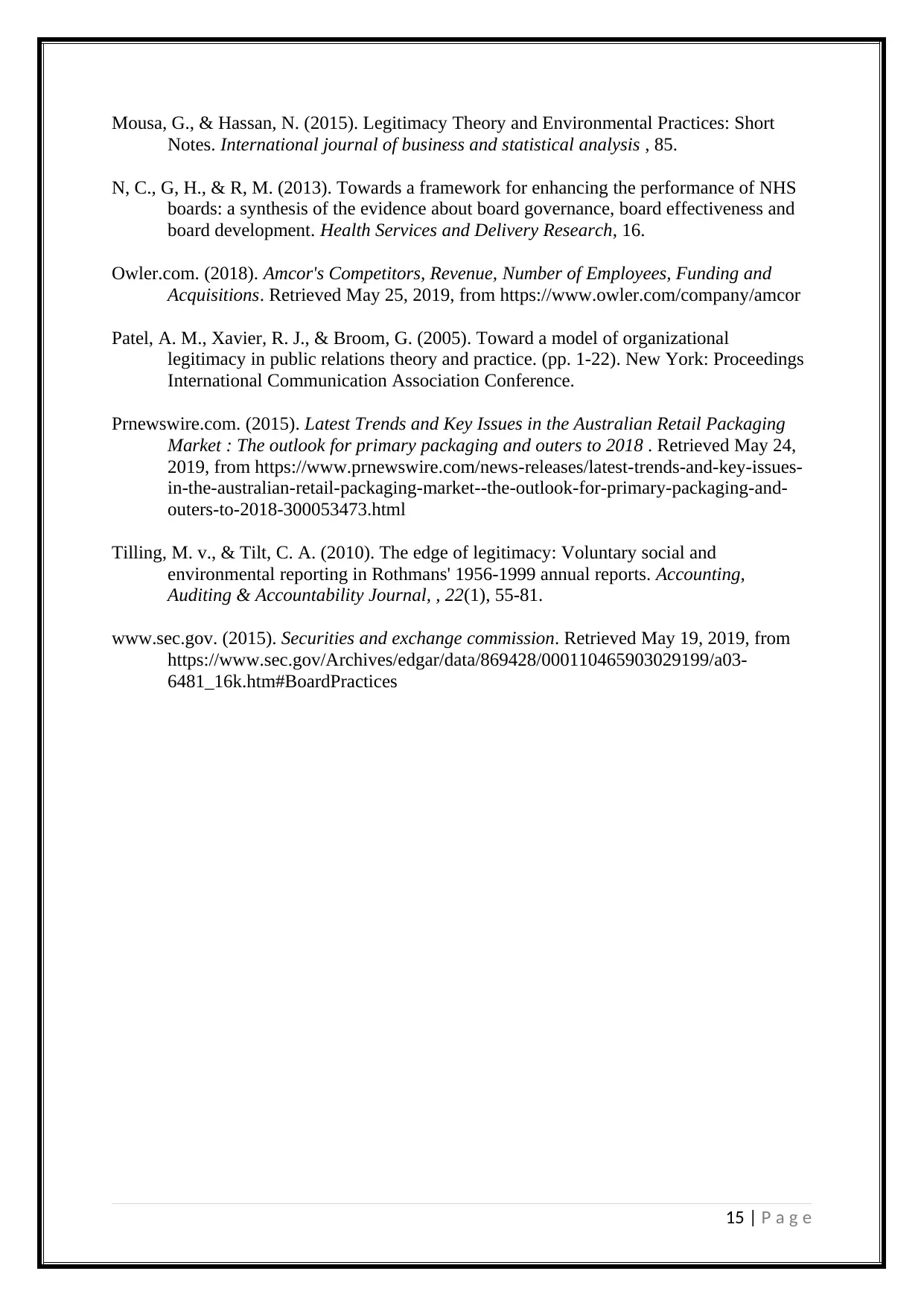
Mousa, G., & Hassan, N. (2015). Legitimacy Theory and Environmental Practices: Short
Notes. International journal of business and statistical analysis , 85.
N, C., G, H., & R, M. (2013). Towards a framework for enhancing the performance of NHS
boards: a synthesis of the evidence about board governance, board effectiveness and
board development. Health Services and Delivery Research, 16.
Owler.com. (2018). Amcor's Competitors, Revenue, Number of Employees, Funding and
Acquisitions. Retrieved May 25, 2019, from https://www.owler.com/company/amcor
Patel, A. M., Xavier, R. J., & Broom, G. (2005). Toward a model of organizational
legitimacy in public relations theory and practice. (pp. 1-22). New York: Proceedings
International Communication Association Conference.
Prnewswire.com. (2015). Latest Trends and Key Issues in the Australian Retail Packaging
Market : The outlook for primary packaging and outers to 2018 . Retrieved May 24,
2019, from https://www.prnewswire.com/news-releases/latest-trends-and-key-issues-
in-the-australian-retail-packaging-market--the-outlook-for-primary-packaging-and-
outers-to-2018-300053473.html
Tilling, M. v., & Tilt, C. A. (2010). The edge of legitimacy: Voluntary social and
environmental reporting in Rothmans' 1956‐1999 annual reports. Accounting,
Auditing & Accountability Journal, , 22(1), 55-81.
www.sec.gov. (2015). Securities and exchange commission. Retrieved May 19, 2019, from
https://www.sec.gov/Archives/edgar/data/869428/000110465903029199/a03-
6481_16k.htm#BoardPractices
15 | P a g e
Notes. International journal of business and statistical analysis , 85.
N, C., G, H., & R, M. (2013). Towards a framework for enhancing the performance of NHS
boards: a synthesis of the evidence about board governance, board effectiveness and
board development. Health Services and Delivery Research, 16.
Owler.com. (2018). Amcor's Competitors, Revenue, Number of Employees, Funding and
Acquisitions. Retrieved May 25, 2019, from https://www.owler.com/company/amcor
Patel, A. M., Xavier, R. J., & Broom, G. (2005). Toward a model of organizational
legitimacy in public relations theory and practice. (pp. 1-22). New York: Proceedings
International Communication Association Conference.
Prnewswire.com. (2015). Latest Trends and Key Issues in the Australian Retail Packaging
Market : The outlook for primary packaging and outers to 2018 . Retrieved May 24,
2019, from https://www.prnewswire.com/news-releases/latest-trends-and-key-issues-
in-the-australian-retail-packaging-market--the-outlook-for-primary-packaging-and-
outers-to-2018-300053473.html
Tilling, M. v., & Tilt, C. A. (2010). The edge of legitimacy: Voluntary social and
environmental reporting in Rothmans' 1956‐1999 annual reports. Accounting,
Auditing & Accountability Journal, , 22(1), 55-81.
www.sec.gov. (2015). Securities and exchange commission. Retrieved May 19, 2019, from
https://www.sec.gov/Archives/edgar/data/869428/000110465903029199/a03-
6481_16k.htm#BoardPractices
15 | P a g e
1 out of 15
Related Documents
Your All-in-One AI-Powered Toolkit for Academic Success.
+13062052269
info@desklib.com
Available 24*7 on WhatsApp / Email
![[object Object]](/_next/static/media/star-bottom.7253800d.svg)
Unlock your academic potential
© 2024 | Zucol Services PVT LTD | All rights reserved.





